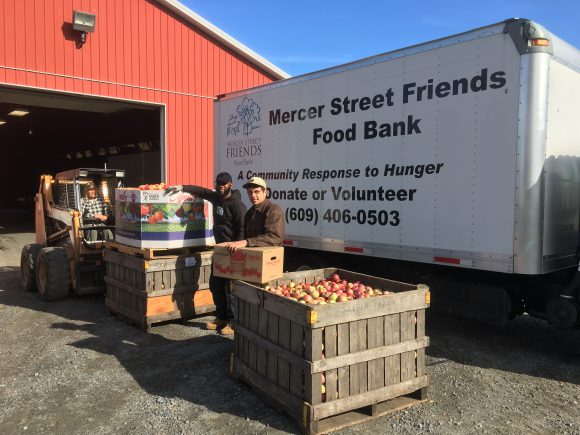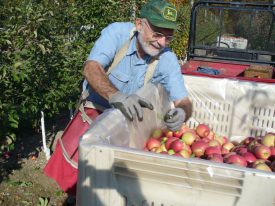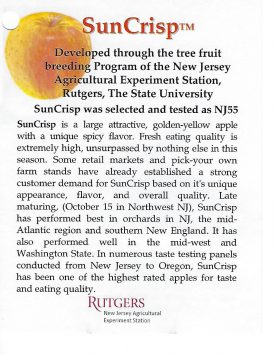
Snyder Farm staff member Curtis McKittrick (r) assists Mercer Street Friends Food Bank in getting a load of Rutgers-grown apples onto their truck.
The Rutgers Snyder Research and Extension Farm in Pittstown, NJ, hosts numerous agricultural research trials by New Jersey Agricultural Experiment Station (NJAES) faculty on the farm’s 390 acres in Hunterdon County. The farm trials span an array of fruit, vegetable, herbs, and hops research that includes breeding, variety trials, insect and disease control, and cultural propagation. By the end of the growing season, the farm has tons of produce on hand, however, unlike commercial farms, its harvests are not destined for retail markets. Under the direction of Snyder Farm director John Grande, the farm staff has organized innovative ways of distributing the fresh-picked produce to those who can use it.
For over 20 years Snyder Farm, working with Rutgers Against Hunger and more recently with community organizations, has been harvesting and distributing tons of high-quality farm-fresh fruits and vegetables to New Jersey food banks and soup kitchens. This massive effort has been orchestrated by farm supervisor Ed Dager. For 2016, with the expansion of tree fruit donations to food banks, this year’s total amounted to 195,701 pounds of produce. The produce includes peaches, apples, sweet corn, potato, peppers, tomatoes, and winter squash. By 2014, the farm had achieved the cumulative total of well over a million pounds of donated fruits and vegetables. Dager has coordinated various groups of volunteers to harvest the produce, including Rutgers Master Gardeners, Rutgers students, local schools, and even corporate sponsor volunteers such as Johnson & Johnson.

Rutgers Master Gardener Dave Johnson fills a bin with fresh-picked apples.
The farm’s bounty was distributed to organizations in Somerset, Morris, Union, Middlesex, Essex, Passaic, Mercer, Hunterdon, Warren, and Sussex counties. Some of the recipient organizations include Flemington Food Pantry, Farmers Against Hunger, Mercer Street Friends Food Bank, NOR’WESCAP, and Giving Gardens. The fresh-picked produce is a welcome contribution to food bank recipients who often have limited access to fresh fruits and vegetables.
New for this year, Snyder Farm implemented the distribution of fruit to Rutgers Dining Services, which reported positive feedback and enhanced fruit consumption by students in response to the apples and peaches being “Rutgers Grown and Jersey Fresh.” With each fruit delivery, the farm staff also provided the fruit varietal information to be displayed in the dining hall, so the students would know the varieties of apples they were eating.

Varietal information for SunCrisp apple.
Lisa Tenore, senior food buyer for Rutgers Dining Services loves the fruit from Snyder Farm “because it is the freshest you can get – you can’t get any fresher!” Dining Services served the peaches during the summer in their cafes and at conferences, and in the fall, apples have been served in the dining halls. Tenore appreciates the extra care Snyder Farm takes to educate the students on what they’re eating in addition to where it came from, “with each delivery they pack a card naming the variety, what it tastes like, and its growing season.”
In addition to feeding New Jersey’s hungry residents and hungry Rutgers students, the farm utilizes a third venue to use the tree fruit. As an extension research farm, Snyder Farm cannot sell its harvest in a way that would compete with sales by commercial growers. It has, however, been able to help local growers expand their produce offerings by selling the tree fruit directly to farmers to supply their roadside markets. This effort generates revenues to maintain the research farm’s orchard and is a joint effort of the New Jersey Horticultural Society and NJAES. Growers contact Snyder Farm to receive an email of inventory of fruit available for sale through direct pick-up at the farm. The revenues generated are utilized to provide labor, supplies, and maintenance for the 12 acres of orchards.
Since the retirement of the Rutgers tree fruit agent this year, on-going tree fruit research by other faculty continues, and the orchard has been managed and maintained by Snyder Farm staff through activities like pruning, thinning, spraying, and harvesting fruit from thousands of trees. These steps are critical to preserving the integrity of the orchard and maintaining the farm’s status as an agricultural showcase.

